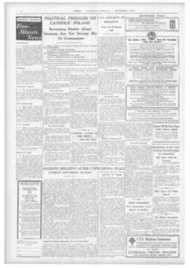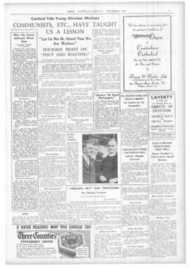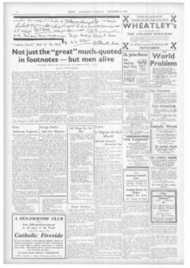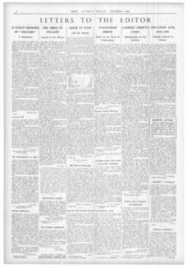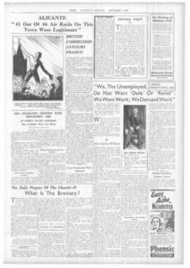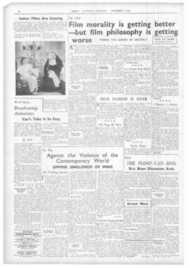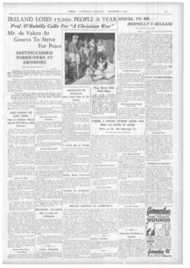Page 10, 9th September 1938
Page 10

Report an error
Noticed an error on this page?If you've noticed an error in this article please click here to report it.
Tags
Share
Related articles
Charles Morgan, Whose Play The Flashing Stream Is Drawing...
The Absolute
Can The World Be Reformed ?
Week By Week
Knowing And Loving
The Play
Against the Violence of the Contemporary World
OPPOSE SINGLENESS OF MIND The Flashing Stream
IN this materialist existence, where values are only valuable when they are tangible, one problem beats insistently against the brain. It arises out of the immaterial other worldliness that is in all of us, which driven back beyond its frontiers, takes its oppression hardly. But should it press too far
forward, how reconcile it with even the highest standards of the outer world? How, in other words, can the spiritual man live harnessed to the secular man? Keep in touch with common things and dream of those quite uncommon?
The artist has his own philosophy and it so often removes him continents away from his fellows. The mystic has found a life which is satisfactory but that sometimes removes him also to contemplative heights that pedestrian man does not ascend. And the problem presses—what is there for those not poets, those not given visions?
It seems the great achievement of Charles Morgan (and it is the Morgan motif recurring throughout his work) that he has found spiritual reality for the ordinary 'nem, and has released him, in the same way as religion releases a man, from the dead dull weight of materialist conception of life.
in The Flashing Strewn, Mr. Morgan points to the release that comes to those of single mind, To Those of those that can lose Single Mind themselves in an "impersonal passion." In his own words:
" Many are persuaded by despair that against the violence of the contemporary world there is no remedy but to escape or to destroy; but there is another within the reach of all—of a woman at her cradle, or a man of science at his instruments, of a seaman at his wheel, or a ploughman at his furrow, of young and old when they love and when they worship—the remedy of a single mind, active, passionate and steadfast, which has upheld the spirit of man through many tyrannies and shall uphold it still. "This singleness of mind, called by Jesus purity of heart, the genius of love, of science and of faith, resembles in the confused landscape of experience a flashing stream, tierce and unswerving as the zeal of the saints to which the few who see it commit themselves absolutely. They are called ' fanatics," and indeed they are not easily patient of those who would turn them aside, but, amid the confusions of policy, the adventure of being man and woman is continued in them . . ."
And side by side with the " impersonal passion " of Commander Edward Ferrers,
R.N., for his matheThe Adventure matics and his inven
tion of anti-aircraft "scorpions," is his adventure of being man, and of Karen Selby of being woman as well as being mathematical genius. To Mr. Morgan the two passions interlock, and there is no question, as in many other philosophical plays, of the so-designated love-interest being a pleat put into the fabric of the play to give greater width of appeal to an assorted audience.
Nothing essential appertaining to any side of' life is treated as an insertion in Mr. Morgan's work. The great humanism which inspires everything he writes (inspires even a modern West-End play with all its necessary and sometimes tiresome conventions) is a synthesis built to include all experience.
Things that Mr. Morgan is doing for the ordinary reader of today is exactly what the medieval Church did for the world of another time. It also gave a synthesis of life's experience; made life an ecstatic adventure; a positive thing intensely valuable in itself, with an explanation and a completion in a great burst of fullness of individuality in a world to follow.
In these days of split Christianity, the searching world feels that religion has become blunted. Most " Anti-Lifr? " sects of today repas Religions sent life without any exhilaration, as a negative series of do-nots and cannots, with only dubious compensation in an uncertain next world.
The virile and absolutely " pro-life " Christian humanism of St. Thomas
Aquinas, which gave dignity and excitement and logic to this tempa-ary existence, has been largely lost outside the Catholic Church. Is it surprising that those who have not found the synthesis they need in other religions should hardly dare to hope for it in yet another religion such as Catholicism, and therefore they turn for a belief to the holiness of the imagination—to the modern philosophical novel such as that of Charles Morgan?
With such other points of completely absorbing interest to discuss, it is nearly possible to forget the work of even a magnificent cast as that of The Flashing Stream. Margaret Rawlings. as the woman capable of the impersonal as well as the personal passion, gave perhaps her greatest performance yet, in a part which fits round her like a glove. Godfrey Tearle, a little less successful, spoke and moved like one living within the character of the philosopher-naval commander and never lost his common touch in his unreserved devotion to mathematics and the project.
The Flashing Stream can never be recommended just as a play to be seen— hut only as an experience that the imagination can live in.
Lyric IRIS CONLAY.
Palestine Singing Ballet
RATHER sadly writes Rina Nikova i.
her introduction to the Palestine Ballet: " It will be a long time, however, before our ancient treasure is restored to the advantage of art."
Maybe this is true. Meanwhile she brings a spontaneous, cheerful series of folk dances and tunes which are lovely to watch and to hear, not so much for their artistry as for their broad, unsophisticated humanity.
Six girls and sixteen items—a hardworked evening for the cast, with no solo
numbers to give them respite. But the Yemenite sextet take such labour for granted, forget it is labour, and sing and de= always as though they loved it. Happiest are they in miming the daily actions• of their life: grinding and sifting flour, gathering brushwood; earning their piastres by performing in the market place;
(Continued at foot of next column.)
blog comments powered by Disqus



